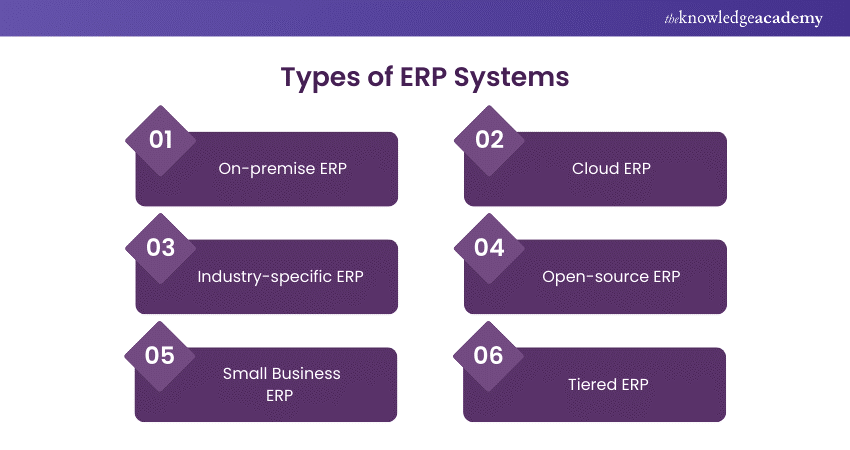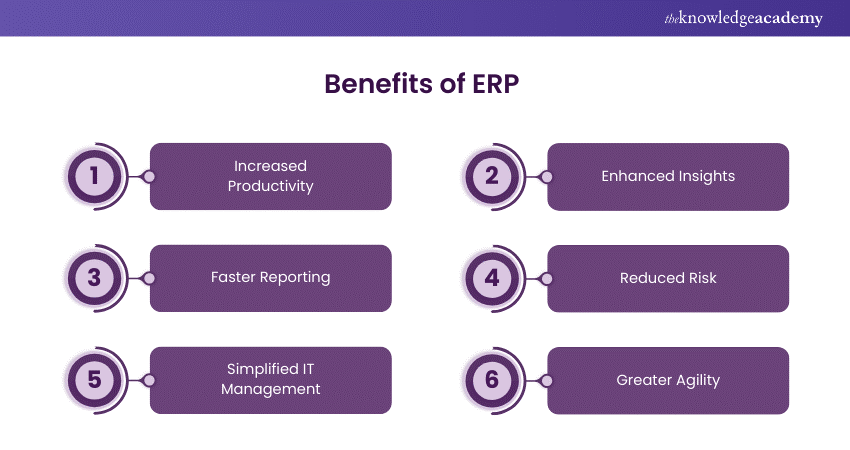We may not have the course you’re looking for. If you enquire or give us a call on 01344203999 and speak to our training experts, we may still be able to help with your training requirements.
We ensure quality, budget-alignment, and timely delivery by our expert instructors.

Have you ever thought about how businesses keep everything running seamlessly? The secret is often in Enterprise Resource Planning (ERP). This all-in-one software solution helps companies manage finance, Human Resources (HR), sales, and much more in one place. In this blog, we take a closer look at what ERP is, the different types of ERP systems, and how they work. We also explore the benefits that ERP brings to businesses across industries. Curious to learn more? Let’s dive into the world of ERP!
Table of Contents
1) What is Enterprise Resource Planning (ERP)?
2) Types of ERP Systems
3) How Does ERP Systems Work?
4) Benefits of ERP
5) Limitations of ERP
6) Examples of ERP Usage
7) Conclusion
What is Enterprise Resource Planning (ERP)?
ERP is a type of software that helps businesses manage their main activities, like finance, Human Resources, manufacturing, supply chain, sales, and purchasing. It brings all these processes together in one system, giving a clear and unified view of everything that’s happening in the company. This way, everyone works with the same information.
Types of ERP Systems
Here are the types of ERP Systems:

On-premise ERP
This type of ERP is installed on a company’s own servers. The company buys the software and has full control over it and the data. It allows for customisation and integration but requires dedicated IT resources for maintenance, updates, and security.
Cloud ERP
Cloud ERPs are hosted on remote servers and accessed via the internet. They offer better scalability, allowing businesses to adjust resources and features as needed without a big upfront investment in hardware. These systems usually have a subscription-based pricing model, and the ERP provider handles updates and maintenance.
Industry-specific ERP
These ERPs are designed to meet the unique needs of specific industries. They include specialised modules and functionalities to handle industry-specific challenges. For example, a manufacturing ERP focuses on Inventory Management and supply chain management, while a financial institution’s ERP would be different.
Open-source ERP
Techniques such as open-source ERPs grant users outright access to the source code and offer companies the advantage of changing, enhancing, or even redistributing the software to their needs. However, they are typically harder to implement and maintain than a commercial ERP system, as they may need more technical knowledge and hardware to operate.
Small Business ERP
These ERPs are designed for Small and Medium-scale enterprises (SMEs). This system is providing core business capabilities at comparatively low costs and are typically less complex than enterprise ERS’ and require customisation.
Tiered ERP
Tiered ERPs provide different levels of functionality and scalability to suit businesses of various sizes and complexities. Companies can choose the tier that matches their current needs and budget, with the option to upgrade or add modules as their requirements grow. For example, a company expanding internationally might add foreign currency modules later on.
Want to increase your sales success? Our comprehensive Sales Training equips you with the skills to excel. Register today!
How Does ERP Systems Work?
Here are the key points on how ERP systems work:
a) Integrated Modules: ERP systems consist of modules or business applications that share a common database, allowing them to communicate with each other.
b) Focus Areas: Each module focuses on a specific business area, such as finance, logistics, procurement, or HR, but they all use the same data.
c) Customisation: Companies can choose the modules they need and add more as they grow.
d) Industry-specific Support: ERP systems can support industry-specific requirements through core functionality or additional applications.
e) Wide Range of Functions: Modern ERP systems offer extensive business functions but need to connect and sync with other applications and data sources to be fully effective.
f) Integration: ERP systems integrate with Customer Relationship Management, (CRM) and Human Capital Management (HCM) software, E-commerce platforms, industry-specific solutions, and other ERPs to provide a unified view of information.
g) Improved Efficiency: This integration improves business process efficiency, customer experiences, and collaboration across teams and partners.
h) Flexibility: Connections to other software products can be established using connectors or others like Application Programming Interface (APIs), Enterprise Service Bus (ESB) and Integration Platform-as-a-Service (iPaaS).
Learn how to implement inventory management with our Supply Chain Management Training – Join today!
Benefits of ERP
Here are six key advantages of using an ERP system:

a) Increased Productivity: By streamlining and automating essential business processes, ERP systems help employees accomplish more with fewer resources.
b) Enhanced Insights: ERP systems eliminate data silos, providing a single source of truth. This allows for quick answers to critical business questions.
c) Faster Reporting: It speeds up business and financial reporting, making it easy to share results. It acts on insights to improve performance in real time.
d) Reduced Risk: ERP systems enhance business visibility and control, ensure compliance with regulations. It also helps predict and prevent risks.
e) Simplified IT Management: Integrated ERP applications share a common database, simplifying IT Management and making it easier for everyone to work.
f) Greater Agility: With efficient operations and real-time data access, businesses can quickly identify and seize new opportunities.
Limitations of ERP
Some of the key weaknesses include:
a) Organisational Challenges: ERP systems may not eliminate inefficiencies or improve everything if the company doesn’t rethink its organisation. This can lead to incompatible technology.
b) Resistance to Change: ERP systems often fail to meet their objectives because companies are reluctant to abandon old processes. Additionally, they may be hesitant to let go of software that has worked well in the past.
c) Project Fragmentation: Splitting ERP projects into smaller parts can lead to cost overruns. It’s crucial to manage ERP projects as a whole to avoid this issue.
Learn negotiation techniques with our Sales Negotiation Training – Join today!
Examples of ERP Usage
Here are a few examples of ERP:
Manufacturing Companies
Manufacturers use ERP to ensure product quality, manage assets, control overtime costs, and oversee inventory. This helps them track stock movements, identify top and underperforming products, and manage procurement efficiently.
Retail Businesses
With the rise of e-commerce, retail companies need consistent, integrated data to offer self-service options for customers. ERP helps reduce cart abandonments, improve website conversions, and increase average order value.
Service-oriented Companies
Professional services like accounting, tax, engineering, and legal firms use ERP to balance service delivery with financial health. They rely on ERP to stay on schedule, manage project profitability, utilise resources effectively, and seize growth opportunities.
Utility Providers
Utility companies use ERP to manage their capital assets and plan for future services and replacements. ERP helps them forecast spare parts needs, avoiding customer service issues during outages and reducing costs from excess inventory.
Wholesale Distributors
ERP helps wholesalers and logistics firms to reduce distribution expenses, improve inventory turnaround time and reduce order-to-cash cycle. To achieve these goals, they require integrated inventory management and logistics functions, and automation.
Prepare for success with the most commonly asked Resource Planning Interview Questions and Answers. Get ready to stand out in your next interview with confidence and knowledge!
Conclusion
Enterprise Resource Planning (ERP) systems are vital for businesses to manage and integrate their core processes efficiently. By centralising data and providing real-time insights, ERP systems help improve decision-making, streamline operations, and enhance collaboration across departments. Implementing an ERP system can significantly boost a company’s productivity and competitiveness in today’s market.
Learn customer behaviour to optimise the sales process with our Sales Funnels Training – Join today!
Frequently Asked Questions
What are the 5 Components of ERP?

The five main components of ERP are finance, Human Resources, manufacturing, supply chain management, and CRM.
What is the Core Principle of ERP?

The principle of ERP is to integrate all business processes into a single system. This integration provides a unified view of data, improving efficiency and decision-making across the organisation.
What are the Other Resources and Offers Provided by The Knowledge Academy?

The Knowledge Academy takes global learning to new heights, offering over 30,000 online courses across 490+ locations in 220 countries. This expansive reach ensures accessibility and convenience for learners worldwide.
Alongside our diverse Online Course Catalogue, encompassing 19 major categories, we go the extra mile by providing a plethora of free educational Online Resources like News updates, Blogs, videos, webinars, and interview questions. Tailoring learning experiences further, professionals can maximise value with customisable Course Bundles of TKA.
What is The Knowledge Pass, and How Does it Work?

The Knowledge Academy’s Knowledge Pass, a prepaid voucher, adds another layer of flexibility, allowing course bookings over a 12-month period. Join us on a journey where education knows no bounds.
What are Related Courses and Blogs Provided by The Knowledge Academy?

The Knowledge Academy offers various Sales Courses, including Online Sales Training, Sales Negotiation Training, and Supply Chain Management Training. These courses cater to different skill levels, providing comprehensive insights into What is Sales Performance Management?
Our Business Skills Blogs cover a range of topics related to sales, offering valuable resources, best practices, and industry insights. Whether you are a beginner or looking to advance your sales techniques, The Knowledge Academy's diverse courses and informative blogs have got you covered.
Upcoming Business Skills Resources Batches & Dates
Date
 Sales Bootcamp
Sales Bootcamp
Fri 9th May 2025
Fri 11th Jul 2025
Fri 12th Sep 2025
Fri 14th Nov 2025






 Top Rated Course
Top Rated Course



 If you wish to make any changes to your course, please
If you wish to make any changes to your course, please


